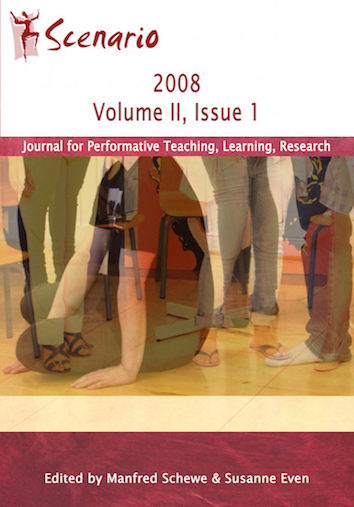Workshop in German Drama
DOI:
https://doi.org/10.33178/scenario.2.1.2Abstract
This article presents a model for teaching a true four-skills second language course in German using student drama performance as the primary vehicle of instruction. Students in this workshop-style course learn to closely read literary German drama while enacting key scenes using authentic period acting techniques. Both the study of literary drama and the historical acting techniques with which they were performed offer students special access to important elements of German culture during notable eras while sharpening their mastery of advanced vocabulary and linguistic structure in German. The value of teaching drama through active learning, as well as the use of reflection in assessment are among the topics explored in this article. This article presents a model for teaching a true four-skills second language course in German using student drama performance as the primary vehicle of instruction. Students in this workshop-style course learn to closely read literary German drama while enacting key scenes using authentic period acting techniques. Both the study of literary drama and the historical acting techniques with which they were performed offer students special access to important elements of German culture during notable eras while sharpening their mastery of advanced vocabulary and linguistic structure in German. The value of teaching drama through active learning, as well as the use of reflection in assessment are among the topics explored in this article.References
[SCBibliograpySection] Primary Literature
Brecht, Bertolt (2003): Mutter Courage und ihre Kinder. Ditzingen: Reclam
Büchner, Georg (1987): Leonce und Lena. Frankfurt: Athenaum
Grillparzer, Franz (1970): Weh dem, der lügt! Stuttgart: Reclam
Hauptmann, Gerhart (1992): Vor Sonnenaufgang. Frankfurt: Suhrkamp
Schiller, Friedrich (1999): Kabale und Liebe. Frankfurt: Suhrkamp
Barnett, Dene / Massy-Westropp, Jeanette (1987): The Art of Gesture: The Practices and Principles of 18th Century Acting. Heidelberg: Winter
Brecht, Bertolt (1963): Schriften zum Theater. Frankfurt: Suhrkamp
DiNapoli, Russell (2003): “Towards Natural Engagement in Nonexhibitional Dramatic Role-Plays.” In: Iberica 6, 15-38
Engel, Johann Jakob (1785-86): Ideen zu einer Mimik. Berlin: Auf Kosten des Verfassers
Hammerton, John Alexander (1969): The Actor's Art; Theatrical Reminiscences, Methods of Study, and Advice to Aspirants, Specially Contributed by Leading Actors of the Day. New York: B. Blom
McNeece, Lucy Stone (1983): “The Uses of Improvisation: Drama in the Foreign Language Classroom.” In: The French Review 56/6, 829-39
Merlin, Bella (2001): Beyond Stanislavsky: The Psycho-physical Approach to Actor Training. London: Theatre Arts Books/Routledge
Packard, William (1987): The Art of the Playwright: Creating the Magic of Theatre. New York: Paragon
Piscator, Erwin (1963): Das politische Theater. Reinbek bei Hamburg: Rowohlt
Pfister, Manfred (1977): Das Drama: Theorie und Analyse. München: Fink
Shearier, Stephen (1987): “Language through Literature/Literature through Performance.” In: Teaching Language through Literature 27/1, 30-37
Short, M.H (1981): “Discourse Analysis and the Analysis of Drama.” In: Applied Linguistics 11/2, 180-202
Strasberg, Lee (1987): A Dream of Passion: The Development of the Method. Boston: Little, Brown
Stern, Susan L. (1980): “Drama in Second Language Learning from a Psycholinguistic Perspective.”In: Language Learning 30/1, 77-100
Published
Issue
Section
License
Copyright (c) 2008 the author(s)

This work is licensed under a Creative Commons Attribution-NonCommercial-NoDerivatives 4.0 International License.



